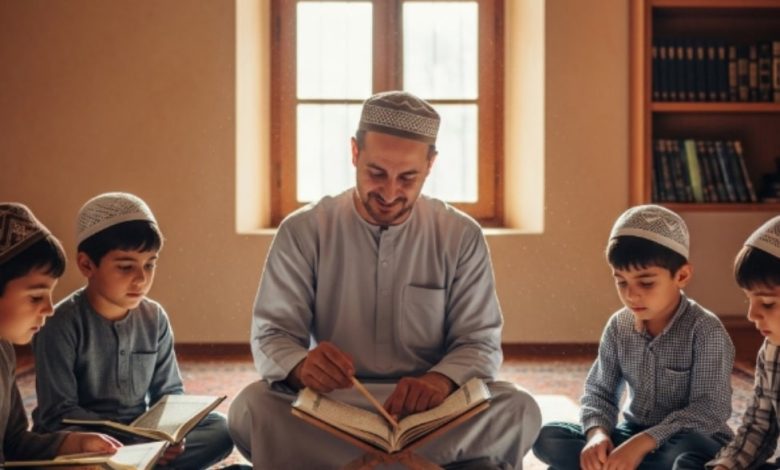Benefits of the Quran Teaching for Kids Building Strong Faith

The journey of learning the Holy Quran is one of the most important aspects of a Muslim child’s upbringing. Parents worldwide seek the best Quran teaching for kids because it lays the foundation for strong faith, good character, and a disciplined life. Just as children learn academic subjects in school, Quran education ensures they grow spiritually and morally, aligning their hearts and minds with divine guidance.
Islam places great emphasis on starting religious education early. The Prophet Muhammad (peace be upon him) encouraged parents to instill love for the Quran in their children, as it serves as a guiding light throughout life. By teaching children the Quran at a young age, we prepare them not only for success in this world but also for eternal rewards in the Hereafter.
Benefits of Quran Teaching for Children
- Strengthening Faith and Belief
The Quran nourishes a child’s faith, reminding them of Allah’s mercy, wisdom, and guidance. Reciting verses daily keeps their hearts connected to spirituality and strengthens belief.
- Developing Respect for Parents and Elders
Through Quranic teachings, children learn the importance of respecting their parents and elders. This value is central to Islamic teachings and helps build stronger family bonds.
- Encouraging Discipline and Patience
Learning the Quran requires regular practice, repetition, and dedication. This naturally instills discipline and patience in children, qualities that benefit them in all areas of life.
- Improving Memory and Concentration
Memorizing Quranic verses enhances cognitive skills such as memory, focus, and critical thinking. Research even suggests that children who memorize parts of the Quran often excel academically.
Long-Term Impact of Quran Education
- Nurturing Future Leaders with Islamic Values
Children who learn the Quran from a young age often grow into adults with a strong foundation in Islamic principles. They become leaders who uphold justice, kindness, and integrity—qualities much needed in today’s world.
- Strengthening Community Bonds
When children come together for Quran classes, they form lifelong friendships rooted in faith. These connections build strong community ties, fostering unity and mutual respect.
- Building Resilience Through Faith
Life comes with trials, but children raised with Quranic guidance develop resilience. They learn to rely on Allah during hardships, which strengthens emotional and spiritual well-being.
Characteristics of the Best Quran Teaching for Kids
- Qualified and Compassionate Teachers
The role of a teacher is central in Quran education. The best Quran teaching for kids is led by instructors who are knowledgeable, patient, and compassionate. A caring teacher not only teaches correct recitation but also instills love and respect for the Quran.
- Engaging and Interactive Learning Methods
Children learn best when they are engaged. Modern Quran teaching incorporates storytelling, visual aids, and fun activities to make lessons more enjoyable. This approach helps kids connect emotionally with the Quran rather than viewing it as a difficult task.
- Safe and Nurturing Learning Environment
A positive learning environment is essential. Whether in a madrasa, school, or online setting, children should feel safe, supported, and encouraged. A nurturing environment helps them overcome challenges and develop confidence in their learning.
Role of Parents in Supporting Quran Learning
- Encouraging Daily Practice at Home
Parents play the most vital role in reinforcing Quran learning. By setting aside time each day for recitation, parents help their children develop consistency. Even just 10–15 minutes daily can make a big difference in building fluency and memorization.
- Leading by Example in Faith and Worship
Children often imitate what they see. When parents actively read the Quran, pray regularly, and show dedication to their faith, children are naturally inspired to follow. This silent yet powerful teaching method strengthens their love for the Quran.
- Balancing School and Quran Studies
Many parents worry about balancing schoolwork with religious studies. However, with a structured routine, both can go hand in hand. Integrating Quran recitation as a calming activity after school helps children unwind and stay spiritually connected.
Overcoming Challenges in Quran Learning for Kids
- Maintaining Children’s Interest and Motivation
One of the biggest challenges is keeping children motivated. Making lessons fun through competitions, rewards, and storytelling keeps their interest alive. Positive reinforcement encourages them to look forward to each session.
- Managing Time Between School and Religious Studies
Time management can be tough, especially for children with packed school schedules. Flexible options like online classes or weekend Quran programs help families create a balance without overburdening kids.
- Addressing Language and Pronunciation Difficulties
Arabic may feel challenging for children who are non-native speakers. Teachers who specialize in tajweed (correct pronunciation) use step-by-step techniques, making it easier for kids to master proper recitation gradually.
Frequently Asked Questions (FAQs)
- At what age should children start learning the Quran?
Most scholars recommend starting Quran education between the ages of 4 and 6, when children can absorb knowledge quickly. However, even earlier exposure through listening can be beneficial.
- How can parents choose the best Quran teaching for kids?
Look for qualified teachers, a supportive learning environment, and engaging teaching methods. Online reviews, recommendations, and trial sessions can help parents make the right choice.
- How can non-Arabic-speaking kids learn the Quran?
With the help of tajweed-focused teachers, children can gradually master correct pronunciation. Interactive apps and visual learning aids also make it easier for them to learn Arabic letters and sounds.
Conclusion
The best Quran teaching for kids is not just about memorizing verses—it’s about shaping character, nurturing faith, and preparing children for life’s challenges. With compassionate teachers, supportive parents, and engaging methods, children can develop a strong bond with the Quran that guides them throughout their lives.
Investing in Quran education today means raising a generation that values kindness, discipline, and spirituality. It is one of the greatest gifts a parent can give, for it ensures both worldly success and eternal blessings.






